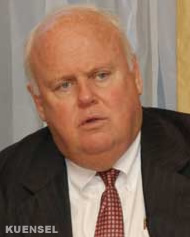 |
Bhutan Development |
|
 |
Bhutan Information |
|
|
 |
| World
Food Programme in Bhutan |
 |
|
WFP
Bhutan partnership: the best in the world
|
 |
 |
Mr. James T Morris, Executive Director of WFP
| The
cooperation between the World Food Programme (WFP) and Bhutan could be
described as the best in the world, said the Executive Director of WFP,
Mr. James T Morris, who was in the country from September 29 to October
1 to commemorate three decades of partnership between WFP and Bhutan.
The
Executive Director said that WFP would continue its support for the next
10 years primarily in the School Feeding Programme but would reduce its
support in other areas. |
|
|
Mr.
Morris is the first WFP executive director to visit Bhutan |
 |
"We
have an understanding with the government that we will be here till 2015
while the government will take more of the responsibilities over the next
10 years," said Mr. Morris. The assistance in other fronts like the development
of infrastructure, providing accessibility in rural areas would continue
only "for a year or two," said Mr. Morris.
Feeding
children, according to Mr. Morris, is the single most important investment
of the country. "There is no substitute for a country being focused on
its children being well nourished, well fed, and having a chance to go
to school," he said.
"Bhutan
is doing that very well with nearly all of the children in elementary school
years in schools right now. Feeding children would be the bedrock of our
partnership for the next ten years".
In
2005, the WFP had committed about USD 2.2 million to Bhutan of which USD
1.8 million was in direct food assistance and USD 40,000 in non-food assistance.
The WFP also works closely with the Food Corporation of Bhutan to transport
food safely to remote schools around the country.
Mr.
James T Morris said WFP assistance in other areas would be gradually stopped
as Bhutan was fast becoming "prosperous".
"The
gross domestic product is increasing at about 7 to 8 percent annually and
you can see more external investments flowing in," said Mr. James T Morris.
"The hydroelectric industry is growing and you can see a very sophisticated
tourist industry developing."
He
added that WFP had discontinued its assistance in more than 27 countries
in the past decade. "We generally work in the poorest place in the world
where incomes are low and food security is very low. And as places become
more prosperous they don't need us," he said. "There will come a time when
you wont need us and that is something to celebrate."
The
Executive Director who received an audience with His Majesty the King on
September 29 said the development philosophy of Gross National Happiness
and the commitment of His Majesty had inspired him to visit Bhutan. "I
think His Majesty has a very good understanding of what life ought to be
about," he said.
While
in Bhutan, Mr. Morris also visited a WFP assisted school in Thinleygang,
Thimphu, and signed an agreement with the Australian ambassador, Mr. John
Philip McCarthy, where the Australian government committed AUD 250,000
to the School Feeding Programme.
Mr.
Morris became the tenth executive director of the WFP in April 2002. In
July the same year, he was appointed as the UN secretary general, Mr. Kofi
Annan's, Special Envoy for humanitarian needs in South Africa.
| Contributed
by
Tashi Dorji, KUENSEL, Bhutan's National Newspaper |
 |
top
| Links |
 |
 |
 |
External
links |
|



